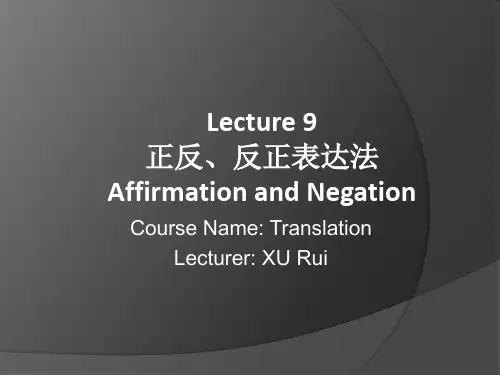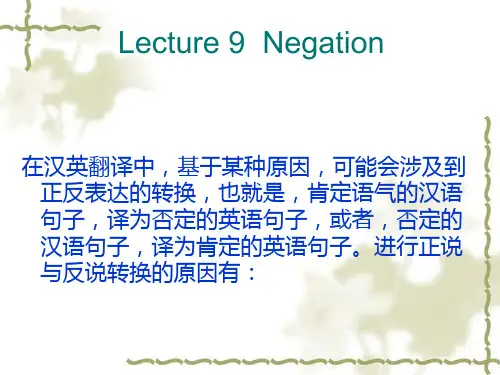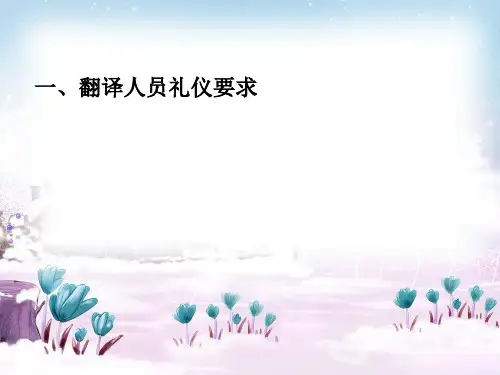第九节 正反、反正翻译法
- 格式:ppt
- 大小:222.00 KB
- 文档页数:20
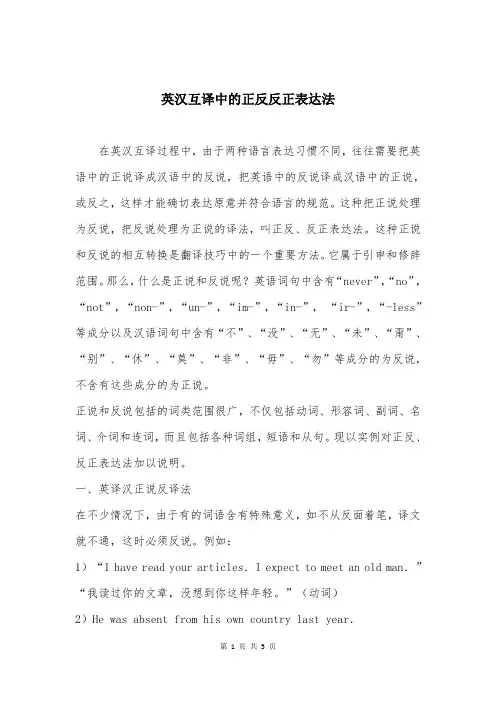
英汉互译中的正反反正表达法在英汉互译过程中,由于两种语言表达习惯不同,往往需要把英语中的正说译成汉语中的反说,把英语中的反说译成汉语中的正说,或反之,这样才能确切表达原意并符合语言的规范。
这种把正说处理为反说,把反说处理为正说的译法,叫正反、反正表达法。
这种正说和反说的相互转换是翻译技巧中的一个重要方法。
它属于引申和修辞范围。
那么,什么是正说和反说呢?英语词句中含有“never”,“no”,“not”,“non-”,“un-”,“im-”,“in-”,“ir-”,“-less”等成分以及汉语词句中含有“不”、“没”、“无”、“未”、“甭”、“别”、“休”、“莫”、“非”、“毋”、“勿”等成分的为反说,不含有这些成分的为正说。
正说和反说包括的词类范围很广,不仅包括动词、形容词、副词、名词、介词和连词,而且包括各种词组,短语和从句。
现以实例对正反、反正表达法加以说明。
一、英译汉正说反译法在不少情况下,由于有的词语含有特殊意义,如不从反面着笔,译文就不通,这时必须反说。
例如:1)“I have read your articles.I expect to meet an old man.”“我读过你的文章,没想到你这样年轻。
”(动词)2)He was absent from his own country last year.他去年不在自己的国家。
(形容词短语)3)He dived into the water fully clothed and rescued the children.他衣服没脱就跳入水中,把孩子救了上来。
(副词)4)He was extremely sorry for the shortness of time.他对时间不足感到十分抱歉。
(名词)5)I do think that it is beyond his power to fulfill the task.我的确认为要完成这项任务是他力所不及的。
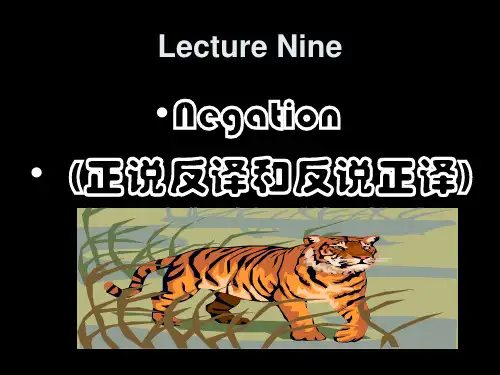
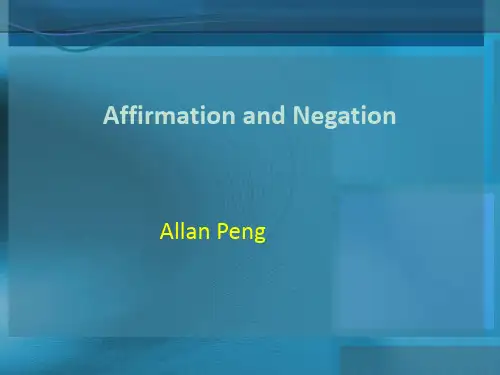
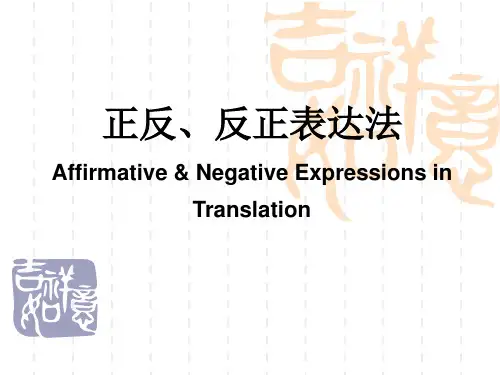
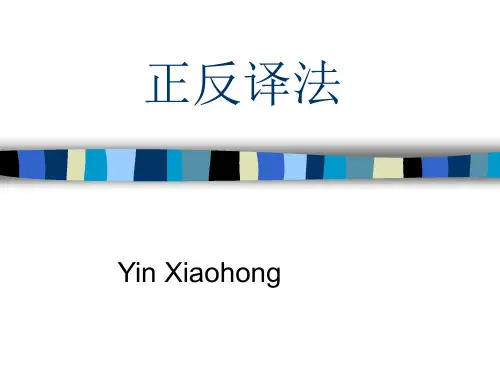
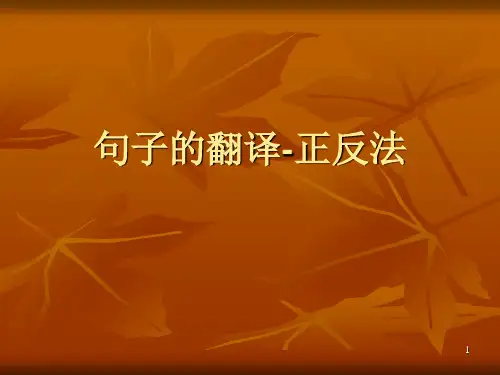
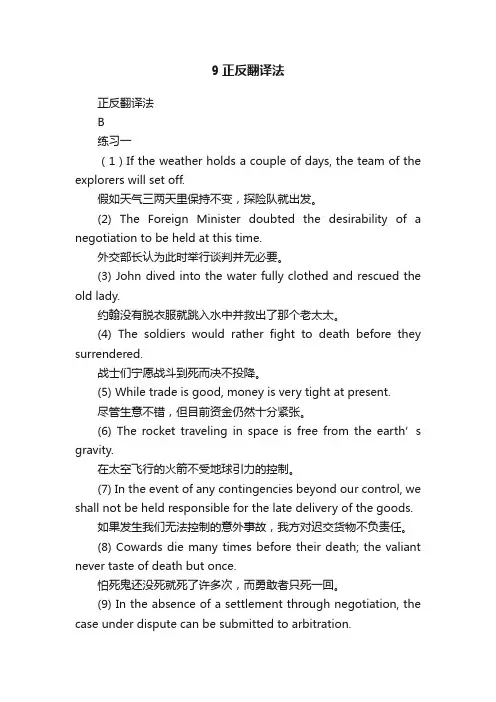
9正反翻译法正反翻译法B练习一(1)If the weather holds a couple of days, the team of the explorers will set off.假如天气三两天里保持不变,探险队就出发。
(2) The Foreign Minister doubted the desirability of a negotiation to be held at this time.外交部长认为此时举行谈判并无必要。
(3) John dived into the water fully clothed and rescued the old lady.约翰没有脱衣服就跳入水中并救出了那个老太太。
(4) The soldiers would rather fight to death before they surrendered.战士们宁愿战斗到死而决不投降。
(5) While trade is good, money is very tight at present.尽管生意不错,但目前资金仍然十分紧张。
(6) The rocket traveling in space is free from the earth’s gravity.在太空飞行的火箭不受地球引力的控制。
(7) In the event of any contingencies beyond our control, we shall not be held responsible for the late delivery of the goods.如果发生我们无法控制的意外事故,我方对迟交货物不负责任。
(8) Cowards die many times before their death; the valiant never taste of death but once.怕死鬼还没死就死了许多次,而勇敢者只死一回。
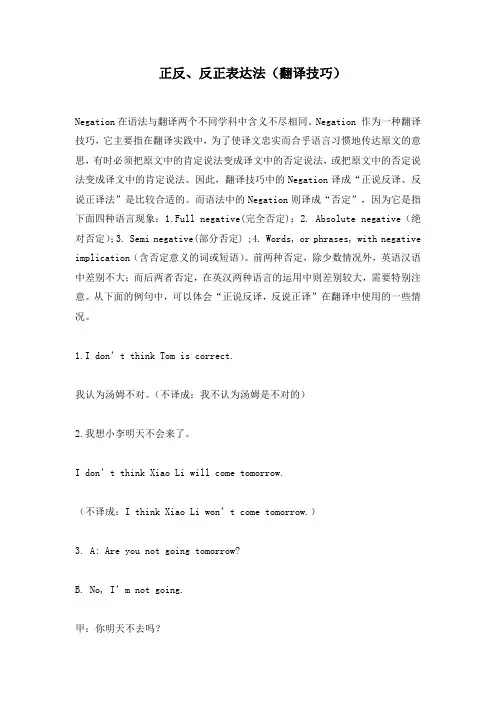
正反、反正表达法(翻译技巧)Negation在语法与翻译两个不同学科中含义不尽相同。
Negation 作为一种翻译技巧,它主要指在翻译实践中,为了使译文忠实而合乎语言习惯地传达原文的意思,有时必须把原文中的肯定说法变成译文中的否定说法,或把原文中的否定说法变成译文中的肯定说法。
因此,翻译技巧中的Negation译成“正说反译、反说正译法”是比较合适的。
而语法中的Negation则译成“否定”,因为它是指下面四种语言现象:1.Full negative(完全否定);2. Absolute negative(绝对否定);3. Semi negative(部分否定) ;4. Words, or phrases, with negative implication(含否定意义的词或短语)。
前两种否定,除少数情况外,英语汉语中差别不大;而后两者否定,在英汉两种语言的运用中则差别较大,需要特别注意。
从下面的例句中,可以体会“正说反译,反说正译”在翻译中使用的一些情况。
1.I don’t think Tom is correct.我认为汤姆不对。
(不译成:我不认为汤姆是不对的)2.我想小李明天不会来了。
I don’t think Xiao Li will come tomorrow.(不译成:I think Xiao Li won’t come tomorrow.)3. A: Are you not going tomorrow?B. No, I’m not going.甲:你明天不去吗?乙:是的,我不去。
4. ①Africa is not kicking out Western Imperialism ②in order to invite other new masters.①非洲踢出西方帝国主义②并不是为了请进其他新的主子。
(假如不运用“正说反译,反说正译”这一技巧,译文就会成为:“非洲不踢出西方帝国主义为了请进其它新的主子。
